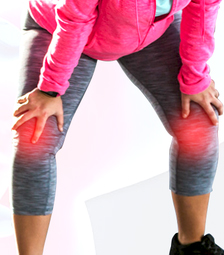Living with Knee pain is a common complaint nowadays that affects people of all ages. But it is one of the most common complications of being overweight or obese. If you’re among the many people who experience chronic knee pain, even a small weight loss can help reduce pain and lower the risk of osteoarthritis (OA).
Osteoarthritis is a condition where the joints become painful and stiff, especially in the morning. Depending on the severity, treatment options typically include medication, physical and occupational therapy, physical activity such as stretching, or surgery
According to study 90 % of people suffering from knee pain are either overweight (with a BMI between 25 – 29.9) or obese (with a BMI of 30 or higher).
This extra weight increases the stress on your knees. That stress can cause chronic pain and lead to other complications such as osteoarthritis (OA).
If you are overweight, even modest weight loss can reduce the risk of osteoarthritis and its progression. Losing the weight will also reduce some of the stress of the knee, which can be helpful, regardless of the problem.
How weight loss affects knee pain
Losing weight benefits knee pain in two ways.
- Decreases weight-bearing pressure on the knee: Every amount of weight loss can reduce the load on the knee joint. Less pressure means less wear and tear on the knees. This lowers the risk of OA.
- Reduces inflammation in the body: Osteoarthritis is considered a wear and tear disease due to the prolonged excess pressure on the joints, particularly on the knees, which, in turn, caused inflammation.
Being overweight may increase inflammation in the body which can lead to joint pain. Losing weight can reduce this inflammatory response. One study suggests that just a 10 percent reduction in weight can significantly lower inflammation in your body.
How weight and knee pain related?

Being overweight or obese significantly increases a person’s risk of developing osteoarthritis.
Let’s look at the weight and your knees. When you walk across the level ground, the force on your knees is the equivalent of 1½ times your body weight. That means a 100 kg man will put 150 kg of pressure on his knees with each step. When you walk on the inclined surface the pressure is even greater: the force on each knee is two to three times your body weight when you climb up and down stairs, and four to five times your body weight when you bend t to tie a shoelace or pick up the dropped item.
Losing a few kilograms can go a long way toward reducing the pressure on your knees and protecting them. For example, research has proven that a sustained 5-8 kg weight loss in obese young people can help to translate to a much lower risk of osteoarthritis later in life.
According to a study, the women who are overweight are four times more likely to develop OA than women who are a healthy weight. And men who are overweight are five times more likely to develop OA than men who are a healthy weight.
But losing even a small amount of weight can be a benefit in the knee pain.
The study tracked 240 overweight and obese adults who had knee pain suffered from osteoarthritis. Those who lost at least 10 percent benefitted in a number of ways like significantly less pain, had better knee function, were able to walk farther in a six-minute test, and had decreased inflammation and bone-on-bone compression.
How to Lose Weight?
Though the weight loss is important but sudden excess weight loss harms many body parts so losing weight slowly is very important
You would like to opt for a program that combines the right diet plan and appropriate exercise which is best for any significant weight loss effort.
You have to take the necessary steps to manage your weight to protect your knees from joint pain and reduce your risk of osteoarthritis.
Some Natural Remedies for Knee Pain

Turmeric & Ginger Tea: Turmeric and ginger are both anti-inflammatory and will help with osteoarthritis. Turmeric is having an active ingredient called curcumin, which is a powerful antioxidant. It also helps to lower the levels of two enzymes responsible for causing inflammation

Epsom salt soak: Epsom salt contains magnesium sulfate, which is a naturally occurring mineral, used to get relief from pain.

Lubrication with Virgin Olive Oil: Olive oil is used lubricate your joints and ease arthritis pain, and it turns out, it actually does. The main compound in extra virgin olive oil called oleocanthal inhibits inflammatory enzymes just like Advil or aspirin does.

Peppermint Eucalyptus Oil Blend: Peppermint and eucalyptus have analgesic, or pain-relieving, properties. They produce a cooling sensation which can temporarily override your discomfort, and create a soothing sensation to ease the knee pain.

Apple Cider Vinegar: Apple Cider Vinegar is an excellent source for decreasing your knee joint pain. The alkalizing effect of apple cider vinegar softens mineral build-ups and unhealthy toxins within your knee joint. It also supports to restore joint lubricants to lessen pain and improve mobility. You can mix apple cider vinegar with water and drink it daily before going to bed.

Lemon: The anti-inflammatory traits in lemons help to decrease inflammation, pain and swelling that guide knee pain. The citric acid in lemon acts as a moderator for uric acid crystals, which is the cause of some types of arthritis.
Weight loss is a tough endeavor, but no single action can provide you results but the combination of moderate exercise, and a balanced diet will help you to achieve your weight loss target. Weight loss will help your body not only to live longer but to help you to live pain and disease free life.
For personal guidance do talk to our Experts now Call or WhatsApp +919769516280




